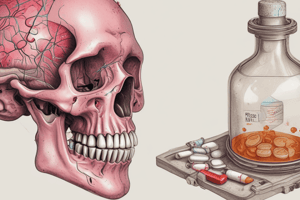Podcast
Questions and Answers
What is the primary mechanism of action of morphine in relieving pain?
What is the primary mechanism of action of morphine in relieving pain?
- Acting directly on the central nervous system (CNS) (correct)
- Inhibiting histamine release
- Contracting the muscles of the bowel and urinary tract
- Stimulating the chemotactic trigger zone
What is the result of histamine release when morphine is injected?
What is the result of histamine release when morphine is injected?
- Intense contraction sensation in the muscles (correct)
- Nausea and vomiting
- Respiratory depression
- Cough suppression
What is the effect of morphine on the pupil size?
What is the effect of morphine on the pupil size?
- Has no effect on the pupils
- Dilates the pupils
- Makes the pupils very small (correct)
- Increases the sensitivity of the pupils
What is the reason for morphine's poor oral bioavailability?
What is the reason for morphine's poor oral bioavailability?
What is the effect of morphine on the bowel and urinary tract?
What is the effect of morphine on the bowel and urinary tract?
What is the most dangerous side effect of morphine?
What is the most dangerous side effect of morphine?
What is the 'rush' produced by morphine mediated by?
What is the 'rush' produced by morphine mediated by?
How does morphine compare to other substances in terms of addiction?
How does morphine compare to other substances in terms of addiction?
What is the potency of oral morphine compared to parenteral morphine?
What is the potency of oral morphine compared to parenteral morphine?
What is morphine sometimes issued in by the military?
What is morphine sometimes issued in by the military?
Flashcards are hidden until you start studying
Study Notes
Morphine Characteristics
- Morphine is a highly potent opiate analgesic drug and the principal active agent in opium.
- It is the prototypical opiate, acting directly on the central nervous system (CNS) to relieve pain.
Mechanism of Action
- Morphine acts on the central nervous system (CNS) and synapses of the nucleus accumbens in particular.
- It produces an intense contraction sensation in muscles due to histamine release.
- It produces a strong 'rush' mediated by several receptors in the CNS.
Administration
- Morphine can be administered parenterally through subcutaneous, intravenous, or epidural injections.
- It can also be administered orally as an elixir, concentrated solution, powder, or in tablet form.
- Oral morphine is only one-sixth to one-third of the potency of parenteral morphine due to poor oral bioavailability.
Side Effects
- Respiratory depression is the most dangerous side effect, which can lead to decreased respiratory rate, sedation, and small pupils.
- Other common side effects include nausea, vomiting, cough suppression, sedation, and dependence leading to addiction.
- Morphine can also cause constipation, delayed emptying of the stomach, and urinary retention due to its effect on the muscle of the bowel and urinary tract.
Studying That Suits You
Use AI to generate personalized quizzes and flashcards to suit your learning preferences.




